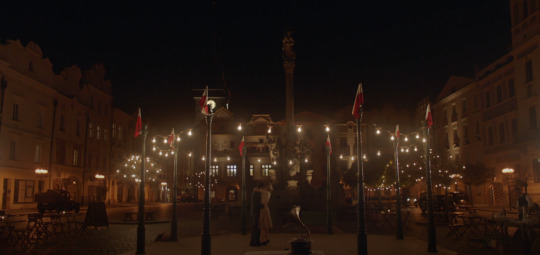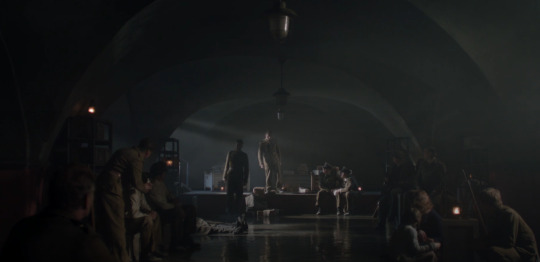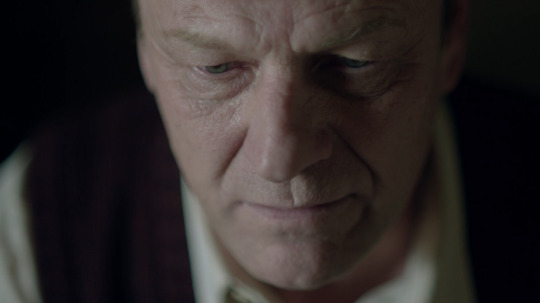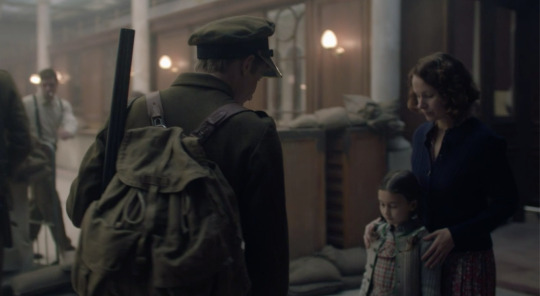#Despite all the chaos of the British Invasion he smiled while he was arrested
Text
I know some folks have been saying “Ed wanted to die in the same place he laid next to Stede-“ WRONG! HE WANTED TO DIE WHERE STEDE LAID NEXT TO HIM!!!
The place Auntie points out as being where his head was crushed by the cannon ball is the exact spot where Stede’s head had been during the arrest and that’s even more insane than the first option.
(Anyway, I wanted to correct that assumption. It’s only a matter of like 2 feet, but I still find it an important detail, and figured a visual might help!)
#Cae Has Lots of Feelings About Our Flag Means Death#GUYS-#HE LAID DOWN IN ONE OF THE LAST PLACES STEDE WAS ON THE REVENGE#HE LET HIS BODY BREAKDOWN AND GIVE TO THE TIRE RIGHT ON THAT SPOT#HE WANTED TO DIE ON THE EXACT SPOT THAT STEDE LOOKED AT HIM AND SAID “You came back.”#I am screaming and crying and feeling every emotion humanly possible#I need us all to know that Edward Teach born on a beach wanted to spend his last moments in a place he remembers so fondly#Despite all the chaos of the British Invasion he smiled while he was arrested#Looking at Stede and waiting to see whatever happened as long as they saw it together#And now Stede's gone#But Edward will be too. Soon.#So he lays down - right there - to wait for it to come#Wearing Stede's Cravat#Soaking up whatever tangential connection to Stede Bonnet remains on his ship#I love him your honor#He is so babygirl#It's also a fun lil easter egg that Frenchie's in pretty much the same place in both shots too lol - but Ed's the crucial part#Our Flag Means Death#OFMD#Our Flag Means Death Season 2 Spoilers#Our Flag Means Death Spoilers#OFMD Spoilers#OFMDS2#OFMD s2 spoilers#Stede Bonnet#The Gentleman Pirate#Edward Teach#Blackbeard#Gentlebeard#OFMD Meta
244 notes
·
View notes
Text
World on Fire, Episode 1

March 1939 – September 1939
World on Fire begins with a blackshirt rally in Manchester. Blackshirts (not to be confused with the Italian group of the same name) were paramilitary supporters of the British Union of Fascists political party, led by Sir Oswald Mosley.
In the middle of this rally, where a mustached man levels all too familiar accusations, a singer named Lois and her interpreter (boy)friend Harry break out in a derisive contrafactum of “Bye, Bye Blackbird.” The two are thrown from the rally and arrested while the fascists remain free to incite violence, an irony that is not lost on Lois or her father, Douglas.
After their parents pay their bail, Lois and Harry part ways, not only because they come from different classes, but also because Harry is leaving for a translator position in Warsaw.

The next thing we know, it’s five months later, and we are introduced to a completely different character, an American journalist named Nancy Campbell. Shades on and swigging from a flash, Nancy swerves down a road along the German-Polish border until she notices something and stops to investigate. Lying at the edge of the woods is a pile of bodies. She attempts to look for identification in the uniforms the dead men are wearing but is startled by the sound of nearby gunfire. German soldiers are executing people in civilian garb, and if that’s not enough of a sign that war is imminent, Nancy finds an entire field littered with (illegal) tanks. As she escapes back to the car, a German soldier fires through the rear window.
“Nazi Germany is a master of illusions, and the greatest illusion of all is that they are seriously negotiation for peace.”
Nancy arrives in Warsaw unscathed and determined. Harry is there too. In the months since he left England, Harry has fallen in love with Kasia, and her family has welcomed him with open arms . But the massacre at the border is not enough to convince his new girlfriend, Kasia, to leave Poland. In the months since he left England, Harry has fallen in love with Kasia, and her family has welcomed him with open arms. Poland isn’t entirely defenseless, either. Her father, Stefan, and brother, Grzegorz, are going to fight for the Free City of Danzig, a key barrier between Poland and Germany. (FINALLY, something that talks about Danzig!)

“What sort of camera is that?” “A Leiker.” “Ah, German-made. Perhaps when Harry clicks the shutter we should all duck.”
Stefan is hopeful that Poland (with the help of the long-promised British support) will successfully push back the German army. Harry can’t bring himself to say that his homeland will likely not honor its promises in the way Stefan envisions. Later that night, he begs with his boss to do something to help the Tomaszeski family, but his boss waves him off.
Nancy is encountering the same reaction with her nephew, Webster, who is currently working as a doctor in Paris and enjoying every minute of its jazz scene. While Harry’s love for Kasia makes him want to flee Warsaw with her, Webster’s budding relationship with saxophone player Albert makes him want to remain in Paris with him.
Ultimately, this first episode places its characters between the delicately balanced familiar and the incoming unfamiliar. Despite the bodies at the border, invasion still feels so abstract as Kasia goes to work as a waitress and Douglas sips his tea at home.
At no point is this more apparent than Stefan and Grzegorz’s arrival in Danzig. Far from a confrontation on a literal battlefield, the father and son prepare to fend off the German arrival from a post office, and it is post office on a little peninsula in Danzig that the first shots of war are fired. (At one point in the first attack, you can see a stack of envelopes go flying over the end of Grzegorz’s carbine.)

Outnumbered and outmanned, the Polish fighters keep fighting for hour after hour, defending the building floor by floor, and finally, room by room. After nearly a day of combat, Grzegorz, Stefan, and Konrad are pinned in the basement with other survivors. Realizing that reinforcements are not coming, Stefan considers surrender, but the others agree to fight on.
As is sometimes done in period pieces, the fictional Stefan is placed in a leadership position instead of the people who actually rallied the fighters and, ultimately, raised the flag of surrender.
The basement in which the survivors are recovering is set ablaze in the final push against the Polish. Grzegorz watches in horror as men are burned alive in the underground inferno. In the chaos, Stefan steps out of the gouged frame of the post office with a make-shift flag of truce. As was, unfortunately, true to life, German soldiers open fire on the surrendering man.

Grzegorz and Konrad escape through the sewers and climb to safety in a bombed-out building. A band of German soldiers enters close behind them, and the two hide behind a door. But Grzegorz, whose congenital cough is exacerbated by the grime of the explosions, coughs, revealing their hiding place. The two are led out into the town and backed against a wall for execution by a very young and frightened German soldier. Seeing his fear, Grzegorz offers the soldier two packets of British cigarettes that Harry gave him earlier. The soldier does not accept the cigarettes, but he does turn away at the sound of another execution. Grzegorz and Konrad use this moment to escape once more.
The young German soldier, it turns out, is the son of Nancy’s neighbors in Berlin. Having returned to her normal assignment in Berlin, Nancy continues to broadcast the progression of the newly-declared war, but with a more conscientious word choice than her typical bluntness. This is Nazi Germany, and her every word is closely monitored.
The Luftwaffe fly over Warsaw in the morning. Harry tries to find Kasia in the chaos and is thrown through the glass doors of the restaurant in the shockwave of a blast. He proposes. Once more, she starts to turn him down out of concern for her family, but she loves him and can’t say goodbye yet. While the city around them recovers from the aerial bombardment, Harry and Kasia elope.
(Only the young and in love can smile as their country is officially being invaded, I guess).

Life is much calmer in Paris, but it is not without danger. Albert the saxophonist arrives at the American hospital where Webster works after being attacked by Action Francaise, a French extremist group that espoused many of the same beliefs as the British Union of Fascists, the Nazi party, etc. As Webster tends to Albert’s wounds, Albert cautiously tries to determine if Webster’s interest stems from music or love.

In England, life seems even safer. Lois has work at a factory and moonlights as a singer, her true passion, to provide for her brother, a happy-go-lucky petty thief, and her father, who turned to pacifism after his experiences in the First World War, experiences which still haunt him with shell shock, though he is embarrassed to admit it. With the declaration of war, there seems less and less of a place for peace in the world, and Douglas is starting to fear that his children, already at odds with his pacifism, will be swept up in war like he was.

Still in school, Kasia’s little brother Jan is already on the verge of growing up too fast. With his father and brother gone, he is technically “Man of the House,” a title swiftly refused by Kasia. She holds Jan tightly and tells him that from now on, he will have to be very brave. Within the course of one episode, Kasia has changed from carefree to heavy-hearted. One way or another, she will have to leave her family behind.
Harry calls his mother, Roberta, and tells her that he will take the next train out of Warsaw. Far removed from any danger (and partial to the very fascism that brought it!), Roberta is too busy planning a party with her wealthy friends to be terribly concerned.
Before he can tell her that he is bringing his new wife home with him, Harry chickens out. There isn’t really a good way to say you’ve moved on from your British kind-of girlfriend that your mother hated to marry your Polish girlfriend that your mother will definitely hate.
But no matter. There’ll be time enough when he gets home.
The train station is packed with people fleeing the city and saying goodbye, perhaps forever, to their loved ones. Harry, dressed in wide-brimmed hat and trench coat like a British Rick Blaine, anxiously waits for Kasia to arrive. But Casablanca, this is not. Kasia emerges from the sea of people, Jan in tow. He’s come to see them off, Kasia explains with a kiss. Harry loads her light suitcase onto the train as Kasia says her goodbyes to her little brother.
And this is where the show convinced me to follow it to the end. As the train begins to leave, Harry holding her suspiciously light suitcase, Kasia lifts Jan onto the train and slams the door behind him. “If you love me,” she shouts to Harry over the shriek of the train whistle, “You’ll watch over Jan.”
As the train carries a stunned Jan and Harry away, Kasia cranes for a final look at the family she will have to live without, for she has made up her mind not to flee as a refugee, but to fight on like her father and her brother and the thousands of other Polish volunteers against the oncoming storm.

Closing Thoughts
At first, I thought it was a strange choice to start the series with Harry and Lois’s arrest, especially since the relationship between the two characters could easily have been communicated through the editing like the Rossler family.
But after rewatching the first episode, I began to realize the bigger themes of this series. The threat of fascism is not simply Germany and Italy versus the World, but a possibility in England and France, too. The inclusion of the BUF and Action Francais brings out the movements that could have risen higher in their countries, blending the simple lines of this country is good, this country is bad often drawn in period pieces.
World on Fire shakes up the typical portrayal of war by basing it on the ground with civilians from perspectives not traditionally seen in media. Sure, there are the strapping young British guys of Harry and Tom who will inevitably be involved in the more familiar portraits of heroics, but the use of a translator and petty criminal as your average war heroes is a twist on the clichés.
More refreshingly, the show spotlights the people often left on the fringes of war portraits, if included at all. The most obvious example of this is Albert Fallou, a gay black French musician (when was the last time you heard those four words together when describing a TV character?). War correspondents, too, are given their due through Nancy, our psuedo-narrator and historical guide who reminds the viewers of how many journalists on the front lines or the heart of enemy territory continued to witness the war at risk of censorship or a more dangerous punishment. The Tomaszeski family especially ascends to the heroes of the episode from the delightful, but doomed Stefan to his resilient children.
Ultimately, this show provokes its viewers to sympathize with the characters and their situations because of how similar the people are regardless of their unimaginable experiences.
Historical Notes
Nancy Campbell is an amalgamation of multiple historic people. Like Claire Hollingworth, the British journalist for The Daily Telegraph, she discovers German forces amassing along the Polish border (while driving a borrowed car). Hollingworth was also responsible for the first report of the war’s outbreak and, in earlier that year, had arranged for the visas of thousands of refugees. Like William L. Shirer and Howard K. Smith, Nancy broadcasts the early days of the war from Berlin.

Professional and uniformed soldier Stefan waving a make-shift white flag is likely a reference to Dr. Jan Michon, the director of the Polish Post Office central to this episode.
There are fleeting moments with other people who were historically involved in the event, too, such as the ten-year old Erwina Barzychowska who was hiding with her family during the onslaught

and Konrad Guderski, who held off the incoming Germans during the first attack with a grenade.

(However, the show makes a confusing choice of including another character named Konrad who escapes with Grzegorz.)
While the war began officially on September 1st, 1939, the Siege of Warsaw did not become a ground fight until a week later (which is why Warsaw is still in relatively good shape by the end of this episode) Polish soldiers and volunteers managed to defend the city for nearly a month until capitulation. The city was officially occupied starting October 1st until January 1945.
Observations
I love the detail that Harry uses a dishrag to change the lightbulb in the camera.
Dan Jones’s score is fantastic, especially during the train station scene when the whistle of the train and the hiss of the wheels are incorporated into the orchestration.
Sources
Danzig:
http://brushesandbayonets.blogspot.com/2016/09/01ix1939-defence-of-polish-post-office.html
http://www.stampnewsnow.com/PDF_Pages/1-Poland.pdf
Clare Hollingworth:
https://www.bbc.com/news/uk-37606306
https://www.bbc.com/news/entertainment-arts-38573643
More on American Reporters:
https://www.loc.gov/exhibits/wcf/
9 notes
·
View notes